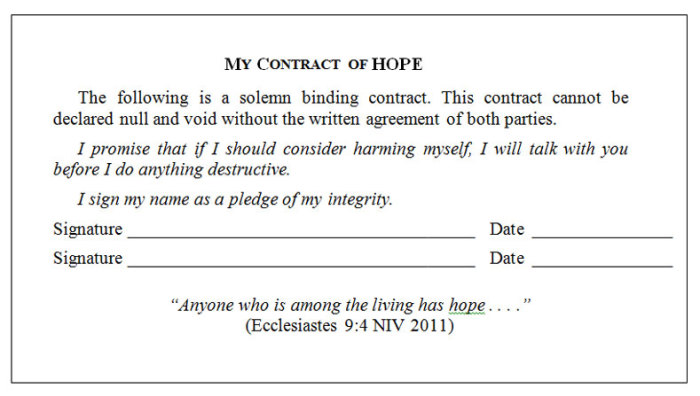The Silver Lining of Suicide
Stammering in shock . . . suspended in grief . . . many of us were emotionally sidelined last week upon hearing of the suicide of Matthew – the 27-year-old son of Rick and Kay Warren of Saddleback Church.
I know the hearts of this dearly loved family . . . their hearts for the Lord and for one another. And I can personally identify with the pain of losing family members, (my uncle and nephew), who both made the devastating decision to end their lives.

Today, our hearts collectively overflow with compassion for the Warren family, praying that each one will experience . . . "The peace of God, that passes all understanding", (Philippians 4:7).
As the youngest of the Warren children, Matthew struggled with mental illness from birth and despite the best medical care, he continually experienced "dark holes of depression."i Ultimately, Matthew died in his California home from a self-inflicted gunshot wound.
The Danger of Depression
Tragically . . . inconceivably . . . almost 1 million people around the world commit suicide each year, believing death is the only way to end their painful despair.ii And depression is the strongest "risk factor" for suicideiii. Matthew certainly fit into this category: one half of all suicides occur in adult men, ages 25-65iv.
Regarding other strugglers around us, we need to recognize the signs of major depression and know how to respond in the hope of averting such a heartbreaking choice like Matthew's. Major depression is a "mood disorder" involving five or more of the following typical symptoms nearly every day for at least two weeksv:
• Pervasive depressed mood
• Diminished pleasure in usual activities
• Lessoned ability to think clearly or concentrate
• Slower or more agitated movements
• Major change in appetite or weight
• Too little/too much sleep
• Fatigue/loss of energy
• Worthless feelings
• Excessive guilt
• Suicidal thoughts/attempts
How to Offer Hope
The most essential lifeline you can provide to a suicidal struggler is HOPE. Hope steadies and undergirds, as Scripture describes . . . "We have this hope as an anchor for the soul, firm and secure" (Hebrews 6:19 NIV 2011). The following acrostic contains pertinent information on how to respond effectively to someone with suicidal tendencies.
H – Honestly Confrontvi
• Take all talk of death and suicide seriously. Repeat back what was said: "I'm hearing you say life's not worth living. Is that right?"
• Identify with their pain and express your concern.
"That must feel painfully empty. I want you to know I care about your pain!"
• Ask these direct questions: "Are you thinking about harming yourself? How…?
Do you have a plan?"
• Seek to find out what problem is causing the pain.
Ask, "What has been so painful that you no longer want to live?"
The Bible presents this compassionate approach. . . .
"The purposes of a person's heart are deep waters,
but one who has insight draws them out."
(Proverbs 20:5 NIV 2011)
O – Offer Options
• Acknowledge the fact, "Life is hard."
• Point out, "Sometimes our only choices in life consist of unpleasant possibilities."
• List possible options on a sheet of paper.
• Rank the options in order of preference.
• Communicate God's purposes for suffering, "One purpose, for example, is to develop compassion: Many people are hurting just like you. They feel desperately alone, assuming no one understands their pain. You know what it's like to deeply hurt. Your personal pain enables you to have a ministry of compassion."
"You are being prepared right now to be a lifeline of hope for someone else who feels hopeless. When you speak with kindness and compassion, you reflect the wisdom of God's Word. . . ."
"Clothe yourselves with compassion, kindness,
humility, gentleness and patience."
(Colossians 3:12 NIV 2011)
P – Present a Contract
• Build a relationship by showing your care and willingness to help.
• Ask the struggler to make a contract with you.
"Will you promise that if you are considering harming yourself, you will call me before doing anything?"
• Be sure to obtain a signature.
• Make a commitment to stay in contact.
"Carry each other's burdens,
and in this way you will fulfill the law of Christ."
(Galatians 6:2 NIV 2011)

E – Enlist Help
• Encourage the struggler to get a physical checkup, first telling the doctor about the feelings of despair.
• Seek a trained counselor or therapist.
• Call a minister.
• Contact the Suicide Crisis Center.
• Help make arrangements for hospitalization.
"Plans fail for lack of counsel,
but with many advisers they succeed."
(Proverbs 15:22 NIV 2011)
A Grief Like No Other
Understandably, those who lose family members to suicide feel more pain than those whose loved ones die of natural causes. They usually feel more rejected . . . even more abandoned . . . and often feel responsible for the suicide. Agonizing emotions can cause survivors to spiral downward into never-ending grief, and their unresolved "Why's?" linger without answers.
The torment of regret can be suffocating for surviving family members following a loved one's suicide. Seemingly endless "what if's" and "if only's" haunt the thoughts and taunt the emotions of the grieving survivors.
Even more grievous, the effects of these unsettled questions can oppressively seep into successive generations . . . if not dealt with in the light of God's truth.
As a survivor, you can feel . . .
Shock .......... "This can't be – I was just with him last night!"
Rejection ..... "He thought death would be better than living with me!"
Guilt ............ "I should have done something to prevent this."
Anger ........... "How could he do this to me?"
Shame .......... "What will others think about me?"
Fear .............. "I'm afraid of whatever is wrong with our family!"
Sadness ........ "I keep dreaming that we'll be together again."
As a survivor, you need to know the compassionate promise of the Lord. He hears your heartache and sees your tears. The silver lining of suicide . . . is experiencing the all-encompassing comfort of our Almighty God. The Bible says that after a period of time . . .
"The righteous cry out, and the Lord hears them;
he delivers them from all their troubles.
The Lord is close to the brokenhearted
and saves those who are crushed in spirit."
(Psalm 34:17-18 NIV 2011)
A Friend Like No Otherviii
There are times . . . as experienced by the Warrens . . . when our most compassionate efforts and our most fervent prayers simply aren't enough. The slide into self-destruction is unstoppable, and loved ones become overwhelmed with grief. At these tragic times, we may find ourselves hesitant to comfort those caught in the aftermath not knowing what to say or what to do to help them. At these tender times, we need to be, "A friend (who) loves at all times", (Proverbs 17:17). Another silver lining of suicide . . . is the opportunity to powerfully and compassionately reflect the love of Christ to those in crisis.
As a friend of the survivor . . .
Be honest ................... Express your own feelings of grief and confusion. Don't hide from the truth or be afraid to use the word suicide.
Be present .................. Be willing to just "be there" – your presence is enough!
Be listening ................ Hear your friend's heart and encourage your friend to express feelings.
Be accepting .............. Accept all emotions, no matter how raw or even offensive they may seem to you.
Be nonjudgmental ..... Refuse to pass judgment on the one who died of suicide. Likewise, don't be judgmental toward those who have survived. I/we can't know all the contributing facts.
Be forgiving ............... Let the survivors see your heart of forgiveness. They may feel the need to confess and receive God's forgiveness, especially if they are experiencing guilt.
Be Spirit-led ............... Be led by the Spirit of God. Be consciously dependent on Him to guide you as to what is appropriate to say and to do.
Be prayerful ............... Offer to pray if the survivor seems receptive. Commit to lifting the whole family up in your personal prayers.
The Bible says, "There is a friend who sticks closer than a brother."
(Proverbs 18:24 NIV 2011)
Ironically – or by God's design – Rick Warren had already prepared his sermon before the weekend of his son's death . . . with the title, "Surviving Tough Times." The assistant pastor said it best: "Even before Rick knew what they would be facing at the end of the week, he was thinking this is what we need to hear. And it is what we need to hear."ix
Consider this silver lining . . . God is attuned to all of our pain, and wants us to emerge as more than conquerors . . .
"No, in all these things we are more than conquerors through him who loved us."
(Romans 8:37 NIV 2011)




























